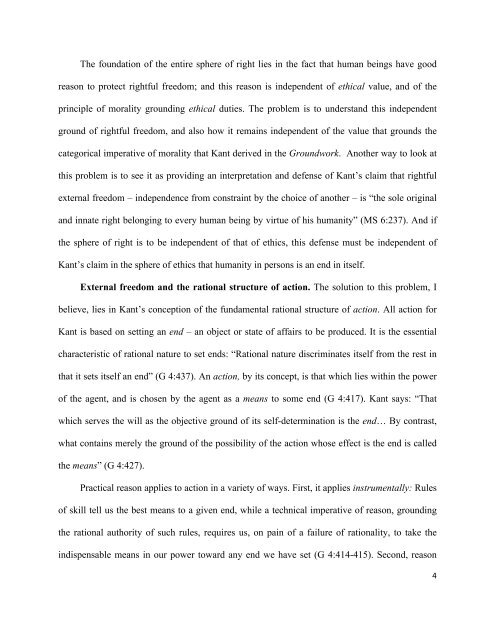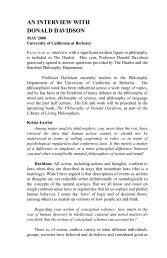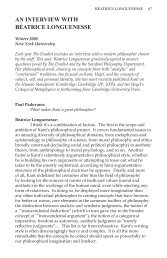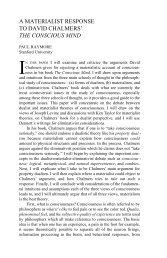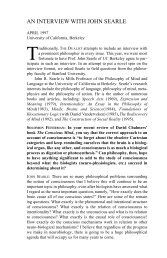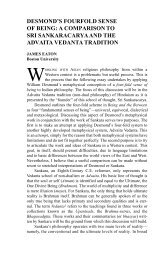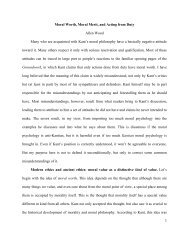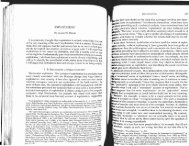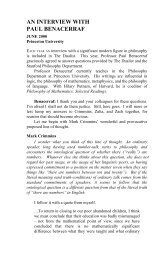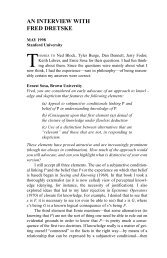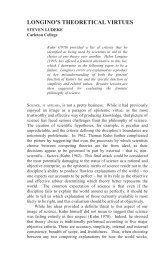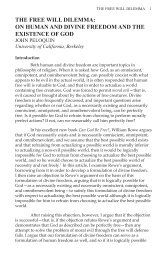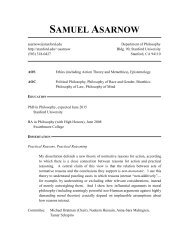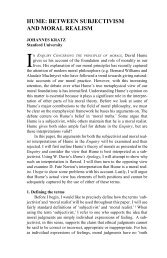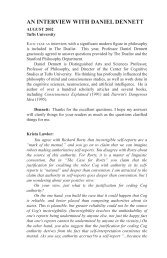The Independence of Right from Ethics Allen Wood Right and ethics ...
The Independence of Right from Ethics Allen Wood Right and ethics ...
The Independence of Right from Ethics Allen Wood Right and ethics ...
You also want an ePaper? Increase the reach of your titles
YUMPU automatically turns print PDFs into web optimized ePapers that Google loves.
<strong>The</strong> foundation <strong>of</strong> the entire sphere <strong>of</strong> right lies in the fact that human beings have goodreason to protect rightful freedom; <strong>and</strong> this reason is independent <strong>of</strong> ethical value, <strong>and</strong> <strong>of</strong> theprinciple <strong>of</strong> morality grounding ethical duties. <strong>The</strong> problem is to underst<strong>and</strong> this independentground <strong>of</strong> rightful freedom, <strong>and</strong> also how it remains independent <strong>of</strong> the value that grounds thecategorical imperative <strong>of</strong> morality that Kant derived in the Groundwork. Another way to look atthis problem is to see it as providing an interpretation <strong>and</strong> defense <strong>of</strong> Kant’s claim that rightfulexternal freedom – independence <strong>from</strong> constraint by the choice <strong>of</strong> another – is “the sole original<strong>and</strong> innate right belonging to every human being by virtue <strong>of</strong> his humanity” (MS 6:237). And ifthe sphere <strong>of</strong> right is to be independent <strong>of</strong> that <strong>of</strong> <strong>ethics</strong>, this defense must be independent <strong>of</strong>Kant’s claim in the sphere <strong>of</strong> <strong>ethics</strong> that humanity in persons is an end in itself.External freedom <strong>and</strong> the rational structure <strong>of</strong> action. <strong>The</strong> solution to this problem, Ibelieve, lies in Kant’s conception <strong>of</strong> the fundamental rational structure <strong>of</strong> action. All action forKant is based on setting an end – an object or state <strong>of</strong> affairs to be produced. It is the essentialcharacteristic <strong>of</strong> rational nature to set ends: “Rational nature discriminates itself <strong>from</strong> the rest inthat it sets itself an end” (G 4:437). An action, by its concept, is that which lies within the power<strong>of</strong> the agent, <strong>and</strong> is chosen by the agent as a means to some end (G 4:417). Kant says: “Thatwhich serves the will as the objective ground <strong>of</strong> its self-determination is the end… By contrast,what contains merely the ground <strong>of</strong> the possibility <strong>of</strong> the action whose effect is the end is calledthe means” (G 4:427).Practical reason applies to action in a variety <strong>of</strong> ways. First, it applies instrumentally: Rules<strong>of</strong> skill tell us the best means to a given end, while a technical imperative <strong>of</strong> reason, groundingthe rational authority <strong>of</strong> such rules, requires us, on pain <strong>of</strong> a failure <strong>of</strong> rationality, to take theindispensable means in our power toward any end we have set (G 4:414-415). Second, reason4


